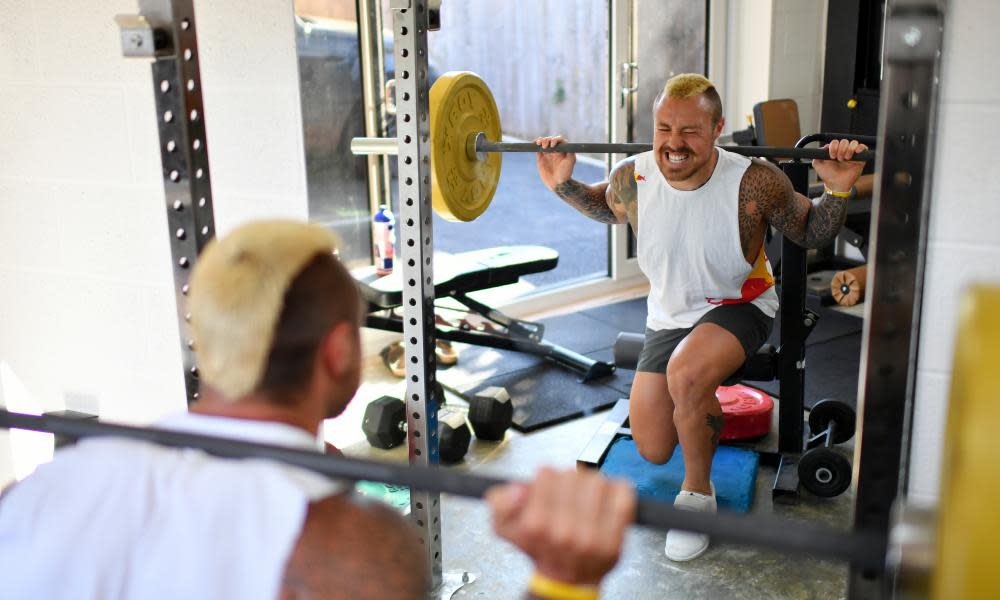Premiership's return to action will give clubs plenty of food for thought

Premiership clubs will learn on Thursday when they can start playing again but it is set to be at the end of July, one month later than intended. That leaves them with the choice of playing the rest of the campaign to its conclusion, nine rounds of matches and two play-off weekends, and delaying the start of the following season, or cutting it short and risk having to pay their broadcasters, BT Sport, a rebate.
Players are due to return to training by the end of the week, first in small clusters who all arrive at the training venue separately and maintain the rules on distancing throughout, and later in groups when contact will be allowed. The gap between starting training and playing will be at least six weeks, the time the Pro14 is budgeting for.
Extending the season into October would lead to a potential clash of fixtures for relegated Saracens, with the Championship campaign set to start in September, but it is understood that clubs in the second tier are in no hurry to resume because, unlike the top flight, their income is derived principally from gate receipts and communal activities, not broadcasting and title sponsorship. With matches expected to be played behind closed doors for at least most of the year – a number of Premiership clubs have delayed the sale of season tickets for 2020-21 – there would be little commercial gain for them.
Related: Premiership players will need six weeks of training before return, study finds
Top-flight clubs need a return to action to start generating income again, having largely mothballed their businesses during the lockdown. There is concern at the cost of following the strict health and hygiene regulations laid down for a phased return to training, not least testing of players, coaches and management teams, which is expected to consume £100,000 a week, as well as protective equipment and the material for deep cleans.
BT has paid its final quarterly instalment of about £8m to Premiership Rugby, which has kept the money in central funds. That would provide the means to pay for testing, with clubs receiving reduced payouts. Add to that the government saying that players would be allowed to remain on furlough up to the point they started playing again, and two of the clubs’ main financial concerns about a return to training have been met.
The key issue then becomes minimising the risk for players. World Rugby’s chief medical officer, Martin Raftery, believes that the physical nature of rugby did not make it more of a risk than other sports because Covid-19 was transmitted through cough, respiratory and saliva droplets rather than sweat, but no one can accurately quantify the risk. Exeter’s director of rugby, Rob Baxter, said playing outdoors would be safer than going to a supermarket, but what about the dressing room, where distancing would have to be maintained?
Professor John Williams, Wales’s former team doctor, who is still involved with the squad, says: “The key will be to manage the risk. The ideal would be for teams to operate in a bubble, but that will not happen, so access to training grounds and dressing rooms will have to be strictly restricted and supervised.
“With players tested regularly, any threat will come from someone outside, so if a player needs treatment for an injury or has a mouth wound that requires dental work, the person carrying out the procedure will need to wear full protective equipment. And players will have to make sacrifices, remaining at home when they are not training or playing, and telling the club doctor immediately if they develop symptoms of the virus. Like everyone, they have to use their common sense.
“As restrictions are gradually lifted, they will not be able to behave like their friends because one failed test could see an entire squad having to isolate. We do not know what the exact risk is and we are continually learning about the virus, but in the case of fit young men, it should be low as long as they take precautions.”
The government’s new test and track system urges isolation for 14 days should anyone have contact with someone with the virus. That would have an impact on the Premiership should someone test positive in the days after a match. The Department for Digital, Sport, Media and Culture has been asked whether the rule applies to professional sportsmen and women.
The Premiership will not be adopting any of the proposed measures of World Rugby’s medical group which, after studying 60 matches, recommended temporary law changes, such as a ban on reset scrums and face-to-face tackling in a drive to minimise close contact. Neither will the Pro14, which has a provisional restart date of 22 August, its schedule complicated by the competition being made up of teams from five nations.
In England, clubs will have to comply with a number of government requirements, including the appointment of a Covid-19 officer. Players have concerns over insurance and their salaries, with 25% cuts across the board being implemented from the beginning of April, but their health will be their overriding concern and they have the right to refuse to start training again without the fear of losing their contract.
“This is a new experience for everyone,” says Williams. “Unless a vaccine is found, life will not return to the way it was before and the communal side of rugby will remain absent. It is about managing and minimising risk, and that involves individual responsibility.”

 Yahoo News
Yahoo News 
